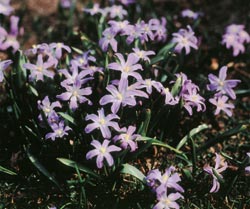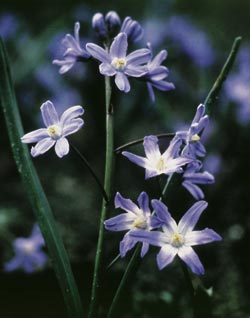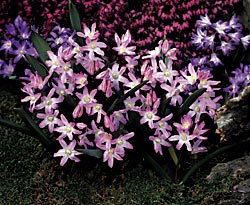by George Papadelis
 www.bulb.com
www.bulb.com
Chionodoxa luciliaeAs spring approaches, gardeners seek the familiar signs of yet another growing season. Even before trees produce their leaves and the spring equinox arrives, the garden can be alive with color from early blooming bulbs. In February, some warming can bring up an occasional flower or two, but by March, color is almost guaranteed through the planting of crocus, snowdrops (Galanthus), or glory-of-the-show (Chionodoxa).
By late March (sometimes early April), glory-of-the-snow produces 6 to 10 one-inch wide, single flowers that last 3 to 4 weeks. Besides their vibrant color, these starry flowers are unique in that each blossom has a distinct white center. The species Chionodoxa forbesii (formerly C. luciliae) has glowing blue flowers, while the variety ‘Pink Giant’ has rosy-pink blooms. Both grow 6 to 10 inches tall. Since the flowers are small, a planting of 20 to 50 bulbs would provide the best show. This is also economically practical since the bulbs are usually inexpensive.
 www.bulb.com
www.bulb.com
Chionodoxa gigantea Glory-of-the-snow is very easy to grow and amongst the hardiest of all bulbs. Only well-drained soil and some sun are required for good performance. Bulbs should be planted with bulb fertilizer in the fall about 3 inches deep and 3 to 4 inches apart. Glory-of-the-snow self-sows and divides itself very freely to form self-sustaining clumps that may last effortlessly for years. However, best results occur if the younger bulbs or “offsets” are dug up in May and replanted with fresh soil, fertilizer, and adequate space.
The only pest problem may be a hungry squirrel looking for a freshly planted snack. If this is a threat in your garden, some chicken wire buried above the bulbs usually does the trick.
Plant glory-of-the-snow in clumps around trees, in the rock garden, or even in your lawn. It works wonderfully alone or in combination with other spring-blooming bulbs. Later-blooming bulbs such as tulips can also be placed in the same planting hole since they require deeper planting depths of 6 to 10 inches. Glory-of-the-snow thrives in woodland situations if tree leaves are shredded, mulched, or raked off to assist them in spring emergence.
 www.waysidegardens.com
www.waysidegardens.com
Chionodoxa ‘Pink Giant’ This tiny spring treasure is a must for any garden because of its versatility, performance, and durability. Try it almost anywhere! Just a few minutes of digging in the fall will allow glory-of-the-snow to grace you with its presence for many years to come.
George Papadelis is the owner of Telly’s Greenhouse in Troy, MI.
At a glance: Glory-of-the-snow
Botanical Name: Chionodoxa (ky-on-oh-DOK-suh)
Plant Type: Bulb
Plant Size: 5-10 inches tall
Flower Color: Rich blue with white centers (most common); also pink, white
Flower Size: 1 inch wide
Bloom Period: Late March – Early April
Leaves: Narrow, upright sprays
Light: Sun-light shade
Soil: Well-drained
Hardiness: Zone 3
Uses: Border, woodland areas, rock garden, nauralizer, lawn
Remarks: Plant in the fall, 3-4 inches deep
